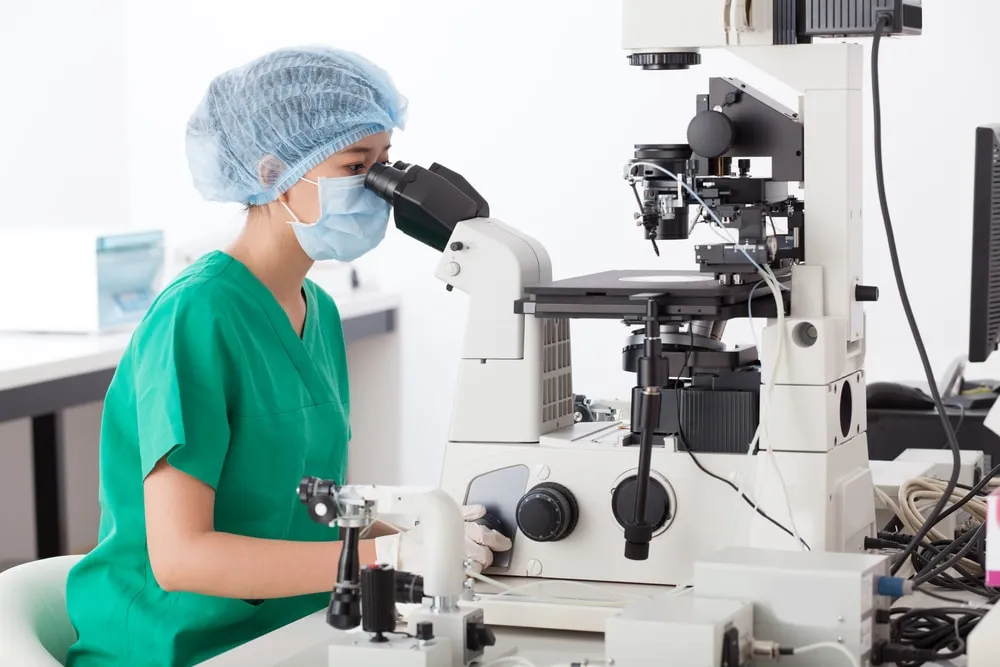
Embryology Training Courses In Ahmedabad
Welcome To Best Clinical Embryo Training Center In Ahmedabad.
Pratham IVF Center in Ahmedabad provides a certified clinical embryo training program that is designed to advance careers in IVF. This training provides essential skills and knowledge in embryo culture, manipulation, and evaluation. By offering hands-on and theoretical learning, the program enables participants to excel in the field of reproductive medicine. The comprehensive training not only enhances expertise but also opens up opportunities in the growing field of assisted reproduction. With Pratham IVF Center's accredited training, individuals can pursue a successful career in the dynamic field of IVF.
Course Objective
- Gain proficiency in embryo culture techniques.
- Master the skills of embryo manipulation and micromanipulation.
- Learn embryo evaluation methods and criteria.
- Understand cryopreservation techniques for embryos.
- Familiarize oneself with quality control and assurance measures in embryology laboratories.
- To provide a thorough rundown of every facet of the ART laboratory, including setup and operation, specialized techniques, and quality control measures to guarantee the best potential success rates in an IVF program.
- to give every apprentice the chance to participate in a comprehensive learning experience and to watch a range of ART treatment techniques.
- Throughout the course, faculty will work one-on-one with trainees, offering a comprehensive overview and ongoing assessment.
Course Structure
The course is structured into theoretical sessions, practical demonstrations, and hands-on laboratory work to ensure a comprehensive learning experience. Participants will engage in:
- Lectures by renowned experts in the field covering topics such as gamete handling, embryo culture systems, and embryo transfer procedures.
- Practical demonstrations of embryo manipulation techniques including intracytoplasmic sperm injection (ICSI) and embryo biopsy.
- Hands-on laboratory sessions under the guidance of experienced embryologists, allowing participants to practice techniques and procedures in a simulated clinical environment.
- Case studies and discussions to enhance problem-solving skills and critical thinking in embryology.
Eligibility Criteria
- Graduates and postgraduates in embryology, reproductive biology, or related fields.
- Practicing embryologists looking to enhance their skills and knowledge.
- Healthcare professionals interested in pursuing a career in assisted reproduction.
Career as an Embryologist
As an embryologist, there are various career opportunities available in the field of reproductive medicine and beyond. Here are some potential career paths:
- Clinical Embryologist: Work in fertility clinics or assisted reproductive technology (ART) laboratories, performing procedures such as in vitro fertilization (IVF), embryo culture, embryo transfer, and sperm analysis. Clinical embryologists play a crucial role in helping couples conceive through assisted reproductive techniques.
- Andrologist: Specialize in the study and analysis of male reproductive health, including sperm function, semen analysis, and male infertility evaluations. Andrologists often work alongside clinical embryologists in fertility clinics.
- Reproductive Geneticist: Combine expertise in embryology with genetics to assess and diagnose genetic disorders in embryos and provide counseling to individuals or couples undergoing fertility treatments. Reproductive geneticists may also specialize in preimplantation genetic testing (PGT) or genetic counseling.
- Research Scientist: Conduct scientific research in academic institutions, biotechnology companies, or pharmaceutical companies, focusing on advancing knowledge in embryology, reproductive biology, or related fields. Research scientists may investigate topics such as embryo development, stem cell biology, or reproductive genetics.
- Educator/Trainer: Share expertise in embryology through teaching and training roles in academic institutions, professional workshops, or continuing education programs for healthcare professionals. Educators play a vital role in training the next generation of embryologists and advancing knowledge in the field.
- Consultant: Provide expert advice and consultation services to fertility clinics, healthcare organizations, or government agencies on matters related to embryology, laboratory practices, quality assurance, and regulatory compliance.
- Entrepreneur: opportunities exist for embryologists interested in starting their own fertility clinic, laboratory, or biotechnology company focused on developing innovative technologies or services in the field of reproductive medicine.
How to Get Admission
As an embryologist, there are various career opportunities available in the field of reproductive medicine and beyond. Here are some potential career paths:
- Research Programs: Look into accredited institutions offering degrees or certifications in embryology.
- Review Requirements: Check admission criteria, including academic transcripts, entrance exams, and any specific prerequisites.
- Submit Application: Complete the application form and provide required documents. Be aware of application fees, if any.
- Interview (if necessary): Participate in an interview to assess suitability for the program.
- Application Review: Admissions committee evaluates your application.
- Course Fees Deposit:If your admission confirmed by the committee, you have to deposite course fees in advance
Meet Our Faculty

Dr. Dharmesh Kapadia
Sr.embryologist (Australia)
Dr. Kalpesh Kapadia
MCh Urologist (gold medalist)
Dr. Kaushal Kapadia
MS Gynec & Art SpecialistAdmission Form
First Step towards becoma e EmbryologistCopyright ©2021 - 2023 Pratham IVF, Best IVF Center in Ahmedabad. Designed By Clients now Technologies
 Ahmedabad Top Rated IVF Center
Ahmedabad Top Rated IVF Center



